London, Great Britain
June 21-July 4, 2004; 128 Draw (32 seeded); Surface – Grass
Rainy Wimbledon witnessed a Goran Ivanisevic’s farewell – former champion had debuted at the All England Club in 1988, in the next decade he was the most successful player beside Pete Sampras out there, despite not being able to win the championships. He came back in 2004 after a two-year break followed by his sensational triumph in 2001. Ivanisevic’s compatriot, Ivo Karlovic won the longest back-to-back tie-breaks (16/14 & 14/12), doing it in two different matches though. Wayne Ferreira made a record for the most consecutive appearances at majors – 55. The biggest British hope, Tim Henman failed once again, and it was the last year of “Henmania”. In a shadow of those occurrences, Roger Federer was winning match after match in an express pace, and defended his title after a tricky four-setter in the final.
All scorelines
First round: AP
Goran Ivanisevic [415], a mere puppy at 32, won his first grass court match since he came out of nowhere, unseeded, to win the 2001 Wimbledon for his only Grand Slam title. They were packed into Centre Court for Ivanisevic’s 6-3, 7-6(4), 6-2 win over No. 31 seed Mikhail Youzhny and, though there were plenty of seats on Court 1 for Navratilova’s win, she was no less adored. Later, the antic and purely spontaneous Ivanisevic, who has expressed disdain for women’s tennis, called Navratilova “one of the few woman tennis players I respect. I cannot compare myself to her,” he said. “She is another level. She is from another planet. She’s 48, 50, I don’t know. How many Grand Slams? How many tournaments? More than a hundred.” The once anointed Croatian Sensation, only 2-9 for the season coming to Wimbledon, played surprisingly well against his Russian opponent, who has a good record on grass. Ivanisevic wasn’t broken in 15 service games, though he admitted that because of his chronically injured left shoulder, he isn’t able to plaster his first serve more than 130 mph. Ivanisevic’s compatriot Ivo Karlovic has done it again. Karlovic, the 6-10 Croatian whose first-round upset of then-defending champion Hewitt last year was one of the biggest in tennis history, knocked off 13th-seeded Paradorn Srichaphan, 3-6, 6-4, 6-4, 6-4, on Monday. Karlovic has a 6-13 singles record this season, including nine first-round losses. “It’s the biggest tournament,” he said. “If I don’t play well here, I ain’t going to play anywhere good.” Srichaphan, who upset Andre Agassi in the second round here two years ago, won the title at Nottingham on Saturday in a three-set victory over Thomas Johansson. He said he paid for that success Monday. “It’s difficult having only one day off,” Srichaphan said. A focused Roger Federer opened the defence of his Wimbledon crown in devastating style on Monday, thrashing Britain’s Alex Bogdanovic 6-3, 6-3, 6-0 in the first round. The Swiss top seed drew the sting out of all Bogdanovic’s shots on an overcast Centre Court, and pummelled countless winners of his own to hammer out his intentions in emphatic style. “It was important to get off to a good start, and I did that,” Federer said. “I soon saw there was not much he could do on my serve. I relaxed, played 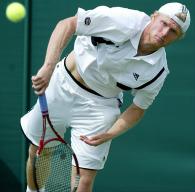 well and am really looking forward to the next one.” Australian Lleyton Hewitt suffered a first-round loss last year – the first men’s champion to lose so early since tennis turned professional in 1968 – but avoided a similar fate on court one with an assured 6-2, 6-4, 6-2 win over Austria’s Juergen Melzer. “I felt good out there,” the Australian said. “I felt like I played the first set pretty well, got out of the blocks well. I was happy with where my game was at today. So I can be confident going into the second round now.” Marat Safin never quite feels as frustrated at other majors, and that’s saying a lot when it comes to a player known for losing his cool. The 2000 U.S. Open champion, seeded 19th here, self-destructed as only he can in a 4-6, 7-5, 6-3, 7-6(1) exit against fellow Russian Dmitry Tursunov, who moved to the United States when he was 12 and is applying for U.S. citizenship. Safin was two points from leading 2-0 in sets, but he fell apart with double-faults and halfhearted effort, watching shots fly past during the final points of his first opening-round defeat at a Slam since the 2000 Australian Open. With former Russian President Boris Yeltsin in the stands, No. 19 Safin’s displays of disgust included cursing at the chair umpire, muttering to himself, smashing rackets and spitting. “I don’t like to play on this surface. I cannot move there. Every time, I don’t know how it’s going to bounce. It’s really a nightmare for me,” Safin said. “After a while, I get bored. I lost completely motivation, and I give up.” All England Club brings out the best in players such as, No. 5 Tim Henman, a four-time semifinalist. He twice was a point from trailing by two sets before coming back to beat Ruben Ramirez-Hidalgo of Spain 4-6, 7-6(6), 6-4, 6-2, or No. 11 Mark Philippoussis, an unseeded finalist last year. He pounded 22 aces to overcome 11 double-
well and am really looking forward to the next one.” Australian Lleyton Hewitt suffered a first-round loss last year – the first men’s champion to lose so early since tennis turned professional in 1968 – but avoided a similar fate on court one with an assured 6-2, 6-4, 6-2 win over Austria’s Juergen Melzer. “I felt good out there,” the Australian said. “I felt like I played the first set pretty well, got out of the blocks well. I was happy with where my game was at today. So I can be confident going into the second round now.” Marat Safin never quite feels as frustrated at other majors, and that’s saying a lot when it comes to a player known for losing his cool. The 2000 U.S. Open champion, seeded 19th here, self-destructed as only he can in a 4-6, 7-5, 6-3, 7-6(1) exit against fellow Russian Dmitry Tursunov, who moved to the United States when he was 12 and is applying for U.S. citizenship. Safin was two points from leading 2-0 in sets, but he fell apart with double-faults and halfhearted effort, watching shots fly past during the final points of his first opening-round defeat at a Slam since the 2000 Australian Open. With former Russian President Boris Yeltsin in the stands, No. 19 Safin’s displays of disgust included cursing at the chair umpire, muttering to himself, smashing rackets and spitting. “I don’t like to play on this surface. I cannot move there. Every time, I don’t know how it’s going to bounce. It’s really a nightmare for me,” Safin said. “After a while, I get bored. I lost completely motivation, and I give up.” All England Club brings out the best in players such as, No. 5 Tim Henman, a four-time semifinalist. He twice was a point from trailing by two sets before coming back to beat Ruben Ramirez-Hidalgo of Spain 4-6, 7-6(6), 6-4, 6-2, or No. 11 Mark Philippoussis, an unseeded finalist last year. He pounded 22 aces to overcome 11 double- faults and eliminate Christophe Rochus of Belgium 6-3, 6-4, 6-2, his first victory in individual tournament play since January. Other seeded losers on the men’s side: No. 16 Jiri Novak, No. 23 Max Mirnyi and No. 28 Ivan Ljubicic, beaten 5-7, 7-6(5), 7-5, 6-2 by Wayne Ferreira, who’s playing in a record 55th straight major (surpassed Stefan Edberg‘s 54). “Players have been congratulating me and saying that they think it’s a great thing. A lot of them have thought about how long it would take them to get to this, and they laugh a lot,” said 32-year-old Ferreira [82]. “They know how difficult it is to stay healthy for this amount of time.” The South African debuted in majors at Wimbledon ’90. It took four days, but Guillermo Coria finally won his first-round match today when rain held off long enough for play to get under way at Wimbledon. The third-seeded Coria, the French Open runner-up, needed just two points to finish off a 6-4, 6-7(3), 6-3, 6-7(3), 6-3 win over 106th-ranked Wesley Moodie of South Africa on Court 1. “It was strange,” Coria said. “I’ve never had to wait three days to finish a match, but it was worth the wait.” The match began Monday, but was halted by rain at two sets apiece. Play resumed Tuesday, but was suspended in late afternoon with Coria two points from victory at 5:3, 30-all in the deciding set. The two never got on court Wednesday as rain washed out the entire day of play. Today’s warm-up lasted longer than the completion of the match. With Moodie making forehand errors on both points, the Argentine needed two minutes to record his first ever win at the All England Club. Relieved to get the match over with at last, Coria beamed, pumped his fist and waved to the crowd. In total, the match took 3 hours, 5 minutes over the four days. “I would have liked this match to finish the day before yesterday,” Coria said. “I went in today seriously concentrating on those two points. I felt strong, I was confident. But it’s unusual to go into a match like this.”
faults and eliminate Christophe Rochus of Belgium 6-3, 6-4, 6-2, his first victory in individual tournament play since January. Other seeded losers on the men’s side: No. 16 Jiri Novak, No. 23 Max Mirnyi and No. 28 Ivan Ljubicic, beaten 5-7, 7-6(5), 7-5, 6-2 by Wayne Ferreira, who’s playing in a record 55th straight major (surpassed Stefan Edberg‘s 54). “Players have been congratulating me and saying that they think it’s a great thing. A lot of them have thought about how long it would take them to get to this, and they laugh a lot,” said 32-year-old Ferreira [82]. “They know how difficult it is to stay healthy for this amount of time.” The South African debuted in majors at Wimbledon ’90. It took four days, but Guillermo Coria finally won his first-round match today when rain held off long enough for play to get under way at Wimbledon. The third-seeded Coria, the French Open runner-up, needed just two points to finish off a 6-4, 6-7(3), 6-3, 6-7(3), 6-3 win over 106th-ranked Wesley Moodie of South Africa on Court 1. “It was strange,” Coria said. “I’ve never had to wait three days to finish a match, but it was worth the wait.” The match began Monday, but was halted by rain at two sets apiece. Play resumed Tuesday, but was suspended in late afternoon with Coria two points from victory at 5:3, 30-all in the deciding set. The two never got on court Wednesday as rain washed out the entire day of play. Today’s warm-up lasted longer than the completion of the match. With Moodie making forehand errors on both points, the Argentine needed two minutes to record his first ever win at the All England Club. Relieved to get the match over with at last, Coria beamed, pumped his fist and waved to the crowd. In total, the match took 3 hours, 5 minutes over the four days. “I would have liked this match to finish the day before yesterday,” Coria said. “I went in today seriously concentrating on those two points. I felt strong, I was confident. But it’s unusual to go into a match like this.” 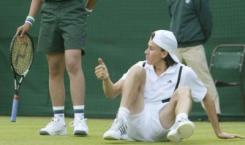 Moodie, who reached the third round here last year as a qualifier, said the delays helped take the strain off his injured left knee. “It was probably more frustrating for him than for me, but it was tiring waiting around all day yesterday for something to happen,” Moodie said. All 74 scheduled matches were postponed Wednesday, the first Wimbledon washout in five years. Of 160 scheduled first- and second-round matches in the first three days, the tournament completed just 83, the fewest since 1991. Play began an hour earlier today to help alleviate the backlog. Men’s doubles matches were reduced to best-of-three sets until the quarterfinals. The sun came out today, but conditions were cool and blustery. The forecast called for showers later in the day. The first match completed – about 42 hours since the last result – was Taylor Dent‘s victory over Ramon Delgado. The American needed two minutes and 40 seconds to close out a 6-2, 6-3, 6-4 win on Court 6. When the skies finally cleared at Wimbledon, Andy Roddick was raring to go. He whacked aces, hit forehand winners and even caught a ball in his cap. With his customary force and flair, Roddick earned a rain-delayed first-round victory Thursday, beating Wang Yeu-Tzuoo 6-3, 7-5, 6-4. Roddick’s niftiest maneuver came after he won the opening game of the final set. A frustrated Wang, 19, slammed the ball into the grass, and when it skipped over the net, Roddick took off his cap and snared it as he walked to the changeover chair. “I had a lot of built-up energy,” he said. That’s because the match was halted by rain Tuesday
Moodie, who reached the third round here last year as a qualifier, said the delays helped take the strain off his injured left knee. “It was probably more frustrating for him than for me, but it was tiring waiting around all day yesterday for something to happen,” Moodie said. All 74 scheduled matches were postponed Wednesday, the first Wimbledon washout in five years. Of 160 scheduled first- and second-round matches in the first three days, the tournament completed just 83, the fewest since 1991. Play began an hour earlier today to help alleviate the backlog. Men’s doubles matches were reduced to best-of-three sets until the quarterfinals. The sun came out today, but conditions were cool and blustery. The forecast called for showers later in the day. The first match completed – about 42 hours since the last result – was Taylor Dent‘s victory over Ramon Delgado. The American needed two minutes and 40 seconds to close out a 6-2, 6-3, 6-4 win on Court 6. When the skies finally cleared at Wimbledon, Andy Roddick was raring to go. He whacked aces, hit forehand winners and even caught a ball in his cap. With his customary force and flair, Roddick earned a rain-delayed first-round victory Thursday, beating Wang Yeu-Tzuoo 6-3, 7-5, 6-4. Roddick’s niftiest maneuver came after he won the opening game of the final set. A frustrated Wang, 19, slammed the ball into the grass, and when it skipped over the net, Roddick took off his cap and snared it as he walked to the changeover chair. “I had a lot of built-up energy,” he said. That’s because the match was halted by rain Tuesday 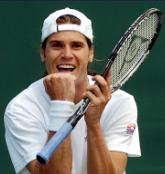 with Roddick leading 4:2 in the first set, and he waited in vain to play for 9 1/2 hours before Wednesday’s schedule was declared a washout. “I’m not good for sitting around with nothing to do. My boredom was killing me,” Roddick said. “But it’s Wimbledon. I think you kind of have to expect it sometimes, and just do your best to roll with the punches.” Todd Martin enhanced his reputation Thursday as a marathon man. Martin, 33, improved to 23-16 in Grand Slam five-set matches by beating Guillermo Canas 4-6, 6-3, 7-6(1), 4-6, 9-7. The match took 3 hours, 43 minutes. Also dramatic five-setter (actually amazing comeback) was won by Tommy Haas. The German saved a match point in a 3rd set tie-break to beat Anthony Dupuis 2-6, 2-6, 7-6(8), 6-4, 8-6. Their meeting was suspended for a day by rain when Haas led 3:2 on serve in the decider. Fellow German, Florian Mayer outsmarted Wayne Arthurs 7-6(4), 7-6(5), 7-6(4) in a match deprived of a break of serve (Arthurs was better in aces, 30-15).
with Roddick leading 4:2 in the first set, and he waited in vain to play for 9 1/2 hours before Wednesday’s schedule was declared a washout. “I’m not good for sitting around with nothing to do. My boredom was killing me,” Roddick said. “But it’s Wimbledon. I think you kind of have to expect it sometimes, and just do your best to roll with the punches.” Todd Martin enhanced his reputation Thursday as a marathon man. Martin, 33, improved to 23-16 in Grand Slam five-set matches by beating Guillermo Canas 4-6, 6-3, 7-6(1), 4-6, 9-7. The match took 3 hours, 43 minutes. Also dramatic five-setter (actually amazing comeback) was won by Tommy Haas. The German saved a match point in a 3rd set tie-break to beat Anthony Dupuis 2-6, 2-6, 7-6(8), 6-4, 8-6. Their meeting was suspended for a day by rain when Haas led 3:2 on serve in the decider. Fellow German, Florian Mayer outsmarted Wayne Arthurs 7-6(4), 7-6(5), 7-6(4) in a match deprived of a break of serve (Arthurs was better in aces, 30-15).
Second round: John Pye
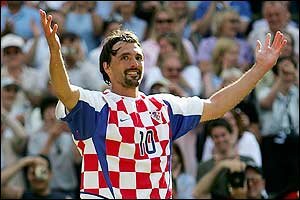 Goran Ivanisevic flung his racket into the crowd, triumphantly raised his arms and then stripped off his shirt and launched it, too. In a scene reminiscent of his celebration as an improbable Wimbledon champion in 2001, Ivanisevic basked in his latest achievement at the All England Club – a second-round victory Thursday over Filippo Volandri, 4-6, 7-6(8), 1-6, 6-3, 6-4. “I wanted to throw the chair, the umpire, everybody,” Ivanisevic said. “But you don’t do that, you know.” The 32-year-old Croat is back at Wimbledon for the first time since he won the title as a wild-card entry three years ago. He’ll return to Centre Court for the first time since the 2001 final when he plays 2002 champion Lleyton Hewitt on Friday. Ivanisevic missed the past two Wimbledons with injuries, mostly shoulder related, and plans to retire after the tournament. He has won nine consecutive matches at Wimbledon, equaling defending champion Roger Federer’s winning streak. Ivanisevic, who often talks of his multiple personalities, said he needed at least three of them to beat Volandri [52]. “I was saying a lot of bad things to myself. How bad I am? How stupid I am?” Ivanisevic said. During a brief rain delay in the fourth set, 1991 Wimbledon champion Michael Stich – now working for the BBC – helped Ivanisevic refocus. “Stich came to me and said, ‘Listen, I’m commentating the match. C’mon man, do something!'” Ivanisevic said. “After I came back, that was a different me on the court. Sun was shining. I started to play better, and that’s why I won.” Lleyton Hewitt has moved into the third round at Wimbledon with a straight sets win over Georgia’s world No. 45 Irakli Labadze. Although Hewitt won 6-4, 6-4, 6-1, the match wasn’t as easy as the score suggested with Labadze’s power game troubling the seventh seed at times. But his power brought Labadze as many wild errors as winners and Hewitt capitalized on his erratic game to progress to the next round. Hewitt broke Labadze in the opening game of the match but that was the only one of eight break points he converted in the first set. He just couldn’t put Labadze away when he had him 15/40, 30/40 and 0/40 in successive games as the erratic Georgian pulled out the big serves and power strikes when it mattered to save himself time and again. A double fault when Labadze tried to throw down a booming second serve ace on his fourth break point down in the second set gave Hewitt the edge. Hewitt had no trouble on his serve and for the second match in a row did not look like dropping it. He broke early in the third set to go 2:1 up when a 25-minute rain break interrupted play and the Georgian didn’t win a game on
Goran Ivanisevic flung his racket into the crowd, triumphantly raised his arms and then stripped off his shirt and launched it, too. In a scene reminiscent of his celebration as an improbable Wimbledon champion in 2001, Ivanisevic basked in his latest achievement at the All England Club – a second-round victory Thursday over Filippo Volandri, 4-6, 7-6(8), 1-6, 6-3, 6-4. “I wanted to throw the chair, the umpire, everybody,” Ivanisevic said. “But you don’t do that, you know.” The 32-year-old Croat is back at Wimbledon for the first time since he won the title as a wild-card entry three years ago. He’ll return to Centre Court for the first time since the 2001 final when he plays 2002 champion Lleyton Hewitt on Friday. Ivanisevic missed the past two Wimbledons with injuries, mostly shoulder related, and plans to retire after the tournament. He has won nine consecutive matches at Wimbledon, equaling defending champion Roger Federer’s winning streak. Ivanisevic, who often talks of his multiple personalities, said he needed at least three of them to beat Volandri [52]. “I was saying a lot of bad things to myself. How bad I am? How stupid I am?” Ivanisevic said. During a brief rain delay in the fourth set, 1991 Wimbledon champion Michael Stich – now working for the BBC – helped Ivanisevic refocus. “Stich came to me and said, ‘Listen, I’m commentating the match. C’mon man, do something!'” Ivanisevic said. “After I came back, that was a different me on the court. Sun was shining. I started to play better, and that’s why I won.” Lleyton Hewitt has moved into the third round at Wimbledon with a straight sets win over Georgia’s world No. 45 Irakli Labadze. Although Hewitt won 6-4, 6-4, 6-1, the match wasn’t as easy as the score suggested with Labadze’s power game troubling the seventh seed at times. But his power brought Labadze as many wild errors as winners and Hewitt capitalized on his erratic game to progress to the next round. Hewitt broke Labadze in the opening game of the match but that was the only one of eight break points he converted in the first set. He just couldn’t put Labadze away when he had him 15/40, 30/40 and 0/40 in successive games as the erratic Georgian pulled out the big serves and power strikes when it mattered to save himself time and again. A double fault when Labadze tried to throw down a booming second serve ace on his fourth break point down in the second set gave Hewitt the edge. Hewitt had no trouble on his serve and for the second match in a row did not look like dropping it. He broke early in the third set to go 2:1 up when a 25-minute rain break interrupted play and the Georgian didn’t win a game on  their return. Roger Federer, the top-seeded defending champion, beat Colombian qualifier Alejandro Falla 6-1, 6-2, 6-0 in just 54 minutes (!!) – one of the fastest men’s matches in recent Grand Slam history – to sweep into the third round. Guillermo Coria, the men’s third seed, had his credentials as a grasscourt novice exposed by 20-year-old German Florian Mayer [66] who clinched a second round 4-6, 6-3, 6-3, 6-4 win. Mayer, the Wimbledon debutant, showed the greater invention throughout with his persistent attempts to draw Coria to the net thanks to a number of clever drop shots. Tim Henman overcame his now familiar stuttering start to book his place in the third round at Wimbledon with a straight sets victory over Switzerland’s Ivo Heuberger. Heuberger served for the opening set at 5:4 before Henman hit back to take the next three games and claim the set. The British number one then gradually took control of the match and ran out a comfortable 7-5, 6-3, 6-2 winner in 2 hours and 6 minutes. Henman will be back on court today as officials try to make up for time lost to the bad weather. Amazing match survived Juan Carlos Ferrero. The Spaniard needed 3 hours 40 minutes to overcome Stefan Koubek 4-6, 7-5, 5-7, 7-6(6), 8-6, being in a position to lose each set he won: *1:4 in the 2nd, 3:5 in the tie-break (in that set he saved all nine break points) and 4:5 (15/40) in the 5th set on return! Ferrero’s compatriot, Feliciano Lopez also won a 14-game deciding set defeating Cyril Saulnier 3-6, 6-3, 6-4, 6-7(3), 8-6. Longer 5th set than Spaniards won Dmitry Tursunov, who prevailed against Sargis Sargsian 6-3, 7-6(5), 3-6, 4-6, 15-13 in 4 hours 1 minute. Ivo Karlovic delivered the longest tie-break since 1992, as he managed to save a bunch of set points in a 4th set tie-break against Gilles Elseneer of Belgium, 6-4, 6-4, 3-6, 7-6(14). The Croat fired 41 aces. Britain’s Greg Rusedski did not quite have enough to overcome eighth seed Rainer Schuettler in the second round. Rusedski won the first set on a tie-break before the German responded by taking the second-set tie-break. Rusedski surged ahead after a third tie-break but Schuettler leveled again as Rusedski suffered a shoulder injury which seemed to restrict his game. Rusedski was unable to maintain his form and Schuettler held his nerve to triumph 6-7(5), 7-6(10), 6-7(5), 6-2, 6-2 in 3.5 hours. “I definitely would like to give it at least another year,” said the former world number four, who missed three months earlier this year as he successfully fought a doping charge. “I would like to come to Wimbledon next year with a full schedule behind me and see how it goes. This year has been very difficult but considering what’s happened I think I have played reasonably well.” Rusedski started the match slowly and lost his serve in the sixth game and was struggling at 0/40 down in the next losing 2:5. However, he found an extra gear, reaching 141 mph on one serve, and managed to win the game saving a triple set
their return. Roger Federer, the top-seeded defending champion, beat Colombian qualifier Alejandro Falla 6-1, 6-2, 6-0 in just 54 minutes (!!) – one of the fastest men’s matches in recent Grand Slam history – to sweep into the third round. Guillermo Coria, the men’s third seed, had his credentials as a grasscourt novice exposed by 20-year-old German Florian Mayer [66] who clinched a second round 4-6, 6-3, 6-3, 6-4 win. Mayer, the Wimbledon debutant, showed the greater invention throughout with his persistent attempts to draw Coria to the net thanks to a number of clever drop shots. Tim Henman overcame his now familiar stuttering start to book his place in the third round at Wimbledon with a straight sets victory over Switzerland’s Ivo Heuberger. Heuberger served for the opening set at 5:4 before Henman hit back to take the next three games and claim the set. The British number one then gradually took control of the match and ran out a comfortable 7-5, 6-3, 6-2 winner in 2 hours and 6 minutes. Henman will be back on court today as officials try to make up for time lost to the bad weather. Amazing match survived Juan Carlos Ferrero. The Spaniard needed 3 hours 40 minutes to overcome Stefan Koubek 4-6, 7-5, 5-7, 7-6(6), 8-6, being in a position to lose each set he won: *1:4 in the 2nd, 3:5 in the tie-break (in that set he saved all nine break points) and 4:5 (15/40) in the 5th set on return! Ferrero’s compatriot, Feliciano Lopez also won a 14-game deciding set defeating Cyril Saulnier 3-6, 6-3, 6-4, 6-7(3), 8-6. Longer 5th set than Spaniards won Dmitry Tursunov, who prevailed against Sargis Sargsian 6-3, 7-6(5), 3-6, 4-6, 15-13 in 4 hours 1 minute. Ivo Karlovic delivered the longest tie-break since 1992, as he managed to save a bunch of set points in a 4th set tie-break against Gilles Elseneer of Belgium, 6-4, 6-4, 3-6, 7-6(14). The Croat fired 41 aces. Britain’s Greg Rusedski did not quite have enough to overcome eighth seed Rainer Schuettler in the second round. Rusedski won the first set on a tie-break before the German responded by taking the second-set tie-break. Rusedski surged ahead after a third tie-break but Schuettler leveled again as Rusedski suffered a shoulder injury which seemed to restrict his game. Rusedski was unable to maintain his form and Schuettler held his nerve to triumph 6-7(5), 7-6(10), 6-7(5), 6-2, 6-2 in 3.5 hours. “I definitely would like to give it at least another year,” said the former world number four, who missed three months earlier this year as he successfully fought a doping charge. “I would like to come to Wimbledon next year with a full schedule behind me and see how it goes. This year has been very difficult but considering what’s happened I think I have played reasonably well.” Rusedski started the match slowly and lost his serve in the sixth game and was struggling at 0/40 down in the next losing 2:5. However, he found an extra gear, reaching 141 mph on one serve, and managed to win the game saving a triple set 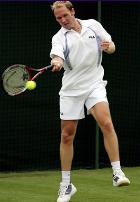 point. Schuettler seemed shocked and Rusedski took advantage to break back before eventually going on to win the tie-break with a forehand volley. Rusedski led *4:2 in the 2nd set, 4:1* in the tie-break, had two set points (7:6, 9:8) but failed to take them and he paid the price when Schuettler, at the fourth time of asking, finally took his opportunity to win the tie-break 12/10. The third set followed the same pattern but this time Rusedski, despite double-faulting twice, took the tie-break after Schuettler blasted a forehand out. At 1:1 in the fourth set, Rusedski tumbled going for a volley and hurt his left shoulder which seemed to put him off and allowed Schuettler to break his serve to take a crucial lead. The Briton had extensive and painful treatment from the trainer before resuming, but Schuettler had the initiative and took the match into a fifth set. Rusedski then double-faulted three times in the fifth game as Schuettler’s superior fitness told and the 30-year-old’s defeat quickly followed. Second-seeded Andy Roddick advanced to the third round of Wimbledon with a 6-3, 7-6(2), 6-4 win Friday over Alexander Peya of Austria. Roddick fired 13 aces and conceded only one break of serve in the 1 hour, 48-minute match on Court 2. Peya lost in the final round of Wimbledon qualifying but advanced to the main draw as a “lucky loser” after Rafael Nadal withdrew due to an ankle.
point. Schuettler seemed shocked and Rusedski took advantage to break back before eventually going on to win the tie-break with a forehand volley. Rusedski led *4:2 in the 2nd set, 4:1* in the tie-break, had two set points (7:6, 9:8) but failed to take them and he paid the price when Schuettler, at the fourth time of asking, finally took his opportunity to win the tie-break 12/10. The third set followed the same pattern but this time Rusedski, despite double-faulting twice, took the tie-break after Schuettler blasted a forehand out. At 1:1 in the fourth set, Rusedski tumbled going for a volley and hurt his left shoulder which seemed to put him off and allowed Schuettler to break his serve to take a crucial lead. The Briton had extensive and painful treatment from the trainer before resuming, but Schuettler had the initiative and took the match into a fifth set. Rusedski then double-faulted three times in the fifth game as Schuettler’s superior fitness told and the 30-year-old’s defeat quickly followed. Second-seeded Andy Roddick advanced to the third round of Wimbledon with a 6-3, 7-6(2), 6-4 win Friday over Alexander Peya of Austria. Roddick fired 13 aces and conceded only one break of serve in the 1 hour, 48-minute match on Court 2. Peya lost in the final round of Wimbledon qualifying but advanced to the main draw as a “lucky loser” after Rafael Nadal withdrew due to an ankle.
Third round: Filip Bondy
Goran Ivanisevic has played his last match at Wimbledon after losing to Lleyton Hewitt in straight sets. The 32-year-old, who won here in 2001 but had to delay his return because of injury, was cheered on by the Centre Court crowd from the moment he walked out. But ultimately the Croat  veteran just could not match the devastating returns of the 2002 winner. Ivanisevic said he had no regrets after playing his final match at Wimbledon. “I knew it was my last match and my last point but for me it was a victory to be here and to play two matches and to play against a Wimbledon champion is amazing.” Hewitt was unsentimental as he closed out a 6-2, 6-3, 6-4 victory but then spoke with the Croat over the net for some time before Ivanisevic walked off to a standing ovation, wearing his beloved Croatian football top. Hewitt admitted that he felt awkward at ending Ivanisevic’s roller-coaster career at Wimbledon. He said: “It was a weird feeling knowing that, if I won, one of the most likeable guys on the tour who is loved by all the crowd would be playing his last match. But I blocked it out the best I could knowing there was opportunity to get into the second week at Wimbledon.” Taylor Dent is still waiting to become the next Pete Sampras, his role model and one-time tutor. He has slowly climbed in the rankings to No. 31 in the world, riding his wicked serve and erratic volley. But he is not there yet, and Andy Roddick‘s passing shots can still leave Dent stranded at the net, and out of any Grand Slam tournament. “His game is so set and solid that he deserves all the results he gets,” Dent said after falling to Roddick in a third-round match on People’s Sunday at Wimbledon, 6-3, 7-6(6), 7-6(1), “His backhand is better, everything is better.” This was always going to be a battle of young Americans with radar-busting serves, but Roddick, 21, has developed his game faster than Dent, 23. This match was essentially over when Dent blew a 6:3* lead in the second-set tiebreaker, including a wide forehand volley on his own serve. “At 6:3, I was thinking, ‘If you win these two
veteran just could not match the devastating returns of the 2002 winner. Ivanisevic said he had no regrets after playing his final match at Wimbledon. “I knew it was my last match and my last point but for me it was a victory to be here and to play two matches and to play against a Wimbledon champion is amazing.” Hewitt was unsentimental as he closed out a 6-2, 6-3, 6-4 victory but then spoke with the Croat over the net for some time before Ivanisevic walked off to a standing ovation, wearing his beloved Croatian football top. Hewitt admitted that he felt awkward at ending Ivanisevic’s roller-coaster career at Wimbledon. He said: “It was a weird feeling knowing that, if I won, one of the most likeable guys on the tour who is loved by all the crowd would be playing his last match. But I blocked it out the best I could knowing there was opportunity to get into the second week at Wimbledon.” Taylor Dent is still waiting to become the next Pete Sampras, his role model and one-time tutor. He has slowly climbed in the rankings to No. 31 in the world, riding his wicked serve and erratic volley. But he is not there yet, and Andy Roddick‘s passing shots can still leave Dent stranded at the net, and out of any Grand Slam tournament. “His game is so set and solid that he deserves all the results he gets,” Dent said after falling to Roddick in a third-round match on People’s Sunday at Wimbledon, 6-3, 7-6(6), 7-6(1), “His backhand is better, everything is better.” This was always going to be a battle of young Americans with radar-busting serves, but Roddick, 21, has developed his game faster than Dent, 23. This match was essentially over when Dent blew a 6:3* lead in the second-set tiebreaker, including a wide forehand volley on his own serve. “At 6:3, I was thinking, ‘If you win these two  points, maybe he misses a first serve, you’re back in with a fighting chance,’ “ Roddick said. “I was lucky enough to get a little slimy return down a little bit, he didn’t really commit to his volley, and he just missed it.” Vince Spadea, having by far the best Wimbledon of his career, isn’t just relaxed. He seems to be floating up there in some orbit. Floating and rapping. Sitting in his post-match press conference Sunday, he suddenly broke into his special patois. “I’m Spadea. I’m not afraid-o-ya. I’m a man of the lady-uhs.” And on and on he went with a cheshire cat smile beaming under a baseball cap that was slightly askew, as if he just came out of the ‘hood in his native Boca Raton, if there is any such thing. If this sort of mirth is the key to making the second week at Wimbledon, then Spadea’s attitude is to let it continue. Sunday, he waxed No. 8 seed Rainer Schuettler 6-4, 6-2, 6-3 to make the round of 16 against Sjeng Schalken, who eliminated Thomas Enqvist 5-7, 6-2, 3-6, 7-6(8), 6-2 saving two match points in the tie-break. On court, Spadea is gotten away for the counter-punching style that has been effective for him on hardcourts and is playing, finally, with the sort of aggressive he has to use on grass courts. “I’ve been more aggressive rather than the usual grinding. I’m taking the ball earlier, My hand-eye coordination has always been a strength and you’re not going to win over here as a counter-puncher – unless you’re Hewitt, and he’s a speed merchant, or Agassi. My best chance is to go for my shot. It’s not a running contest on grass,” said Spadea. Buoyed by the crowd, Tim Henman moved on in his career-long quest to give Britain its first male champion at Wimbledon since 1936, reaching the round of 16 by beating No. 32 Hicham Arazi on Sunday 7-6(6), 6-4, 3-6, 6-2. Chants of ”Hen-man! Hen-man!” and screams of ”Come on, Tim!” rang through Centre Court at the All England Club – two hours before
points, maybe he misses a first serve, you’re back in with a fighting chance,’ “ Roddick said. “I was lucky enough to get a little slimy return down a little bit, he didn’t really commit to his volley, and he just missed it.” Vince Spadea, having by far the best Wimbledon of his career, isn’t just relaxed. He seems to be floating up there in some orbit. Floating and rapping. Sitting in his post-match press conference Sunday, he suddenly broke into his special patois. “I’m Spadea. I’m not afraid-o-ya. I’m a man of the lady-uhs.” And on and on he went with a cheshire cat smile beaming under a baseball cap that was slightly askew, as if he just came out of the ‘hood in his native Boca Raton, if there is any such thing. If this sort of mirth is the key to making the second week at Wimbledon, then Spadea’s attitude is to let it continue. Sunday, he waxed No. 8 seed Rainer Schuettler 6-4, 6-2, 6-3 to make the round of 16 against Sjeng Schalken, who eliminated Thomas Enqvist 5-7, 6-2, 3-6, 7-6(8), 6-2 saving two match points in the tie-break. On court, Spadea is gotten away for the counter-punching style that has been effective for him on hardcourts and is playing, finally, with the sort of aggressive he has to use on grass courts. “I’ve been more aggressive rather than the usual grinding. I’m taking the ball earlier, My hand-eye coordination has always been a strength and you’re not going to win over here as a counter-puncher – unless you’re Hewitt, and he’s a speed merchant, or Agassi. My best chance is to go for my shot. It’s not a running contest on grass,” said Spadea. Buoyed by the crowd, Tim Henman moved on in his career-long quest to give Britain its first male champion at Wimbledon since 1936, reaching the round of 16 by beating No. 32 Hicham Arazi on Sunday 7-6(6), 6-4, 3-6, 6-2. Chants of ”Hen-man! Hen-man!” and screams of ”Come on, Tim!” rang through Centre Court at the All England Club – two hours before 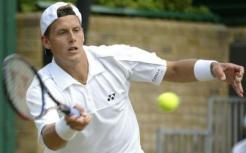 he even set foot on the grass. ”When you walk out on the court, just the buzz and the excitement is incredible,” the fifth-seeded Henman said. ”I needed it at times.” Henman, involved in numerous dramatic 4- and 5-setters at Wimbledon throughout his career, this time saved a set point in the tie-break and a double break point at 0:2 in the 4th set when the deciding set seemed inevitable after Arazi easily took the previous set. Eager to play after Saturday’s all-day rainout, the second of the tournament, Roger Federer and Thomas Johansson stepped out for the Centre Court opener five minutes early. The stadium was two-thirds full at the beginning of Federer’s 6-3, 6-4, 6-3 win – and packed for Henman’s match – but it was desolate elsewhere. Other Johansson, “Pim-Pim” Joachim had a better days, especially as far as serve is concerned and defeated fellow Swede, Jonas Bjorkman 6-7(5), 7-6(5), 7-6(6), 6-3 out-acing him 39-20. The spectators witnessed just one break of serve. In other serve-battle, Ivo Karlovic out-aced Feliciano Lopez 40 to 14 to win 7-6(12), 7-6(3), 6-7(2), 7-5 (the only break came in the last game of the matc, and it was Karlovic’s only break point!).
he even set foot on the grass. ”When you walk out on the court, just the buzz and the excitement is incredible,” the fifth-seeded Henman said. ”I needed it at times.” Henman, involved in numerous dramatic 4- and 5-setters at Wimbledon throughout his career, this time saved a set point in the tie-break and a double break point at 0:2 in the 4th set when the deciding set seemed inevitable after Arazi easily took the previous set. Eager to play after Saturday’s all-day rainout, the second of the tournament, Roger Federer and Thomas Johansson stepped out for the Centre Court opener five minutes early. The stadium was two-thirds full at the beginning of Federer’s 6-3, 6-4, 6-3 win – and packed for Henman’s match – but it was desolate elsewhere. Other Johansson, “Pim-Pim” Joachim had a better days, especially as far as serve is concerned and defeated fellow Swede, Jonas Bjorkman 6-7(5), 7-6(5), 7-6(6), 6-3 out-acing him 39-20. The spectators witnessed just one break of serve. In other serve-battle, Ivo Karlovic out-aced Feliciano Lopez 40 to 14 to win 7-6(12), 7-6(3), 6-7(2), 7-5 (the only break came in the last game of the matc, and it was Karlovic’s only break point!).
Fourth round: Howard Fendrich
It had to happen sometime, at some tournament. Their lives intersected under dire circumstances off the court, and Andy Roddick and Sjeng Schalken were bound to face each other on one, sooner or later. Roddick helped about a dozen people, including fellow tennis players, escape a fatal hotel fire in May before the Italian Open. One, Schalken, will be his quarterfinal opponent at Wimbledon. The second-seeded Roddick reached the final eight at the All England Club by beating Alexander Popp 7-5, 6-4, 6-4 Monday. No. 12 Schalken made it that far for the third straight year, ending No. 30 Vince Spadea‘s surprising run 6-2, 7-5, 3-6, 6-2. “Any time you share a very traumatic situation, and kind of share that fear with someone, and get out of it – there’s always something there,” Roddick said. “I don’t know what that is, but there is kind of something between us now. By the same token, we’re both going to try to win a Wimbledon quarterfinal.” They and other pros  were in Rome the weekend before the start of a clay-court tournament when their hotel caught fire, killing three guests. Schalken was on the seventh floor, Roddick on the sixth. So Roddick waited on his balcony, with outstretched arms, to catch Schalken when he jumped down. Both then were able to use fire truck ladders to reach the ground. Three days after the fire, Roddick lost at the Italian Open, his only first-round defeat in 2004. “Rome was probably the first time in my life I was out on the court and could care less if I won or lost,” Roddick said. “I wanted to go home, and I wanted to see my family.” He and Schalken knew each other before, of course, and now they’ve grown closer, practicing together the day before the start of Wimbledon. But they haven’t squared off in a match that counted since the fire; Roddick is 4-1 against Schalken, including three straight victories. “I hope he’s thinking about that a little bit, and taking it easy on me. He didn’t do that the last three times,” Schalken said. “Before and after, we’ll be good friends, and on the court, we’ll try to win.” Roger Federer stretched his winning streak on grass to 21 matches, and his successful holds of serve at the All England Club to 89 games with a 6-3, 7-6(3), 7-6(5) victory Monday over 6-foot-10 Ivo Karlovic. It’s tough to decide which is more impressive: the way Federer is serving, or the way he completely neutralized the wicked serve of the tour’s tallest player. Karlovic pounded 95 aces through his first three matches. He managed just 14 Monday. An explanation? “I was playing against Federer, who returns unbelievable,” said Karlovic, who stunned Hewitt in the first round last year. Repeatedly, the defending champion figured out a way to put his racket on serves that reached 140 mph, and he didn’t just tap them back over the net. At least five times, Federer swatted return winners. Then
were in Rome the weekend before the start of a clay-court tournament when their hotel caught fire, killing three guests. Schalken was on the seventh floor, Roddick on the sixth. So Roddick waited on his balcony, with outstretched arms, to catch Schalken when he jumped down. Both then were able to use fire truck ladders to reach the ground. Three days after the fire, Roddick lost at the Italian Open, his only first-round defeat in 2004. “Rome was probably the first time in my life I was out on the court and could care less if I won or lost,” Roddick said. “I wanted to go home, and I wanted to see my family.” He and Schalken knew each other before, of course, and now they’ve grown closer, practicing together the day before the start of Wimbledon. But they haven’t squared off in a match that counted since the fire; Roddick is 4-1 against Schalken, including three straight victories. “I hope he’s thinking about that a little bit, and taking it easy on me. He didn’t do that the last three times,” Schalken said. “Before and after, we’ll be good friends, and on the court, we’ll try to win.” Roger Federer stretched his winning streak on grass to 21 matches, and his successful holds of serve at the All England Club to 89 games with a 6-3, 7-6(3), 7-6(5) victory Monday over 6-foot-10 Ivo Karlovic. It’s tough to decide which is more impressive: the way Federer is serving, or the way he completely neutralized the wicked serve of the tour’s tallest player. Karlovic pounded 95 aces through his first three matches. He managed just 14 Monday. An explanation? “I was playing against Federer, who returns unbelievable,” said Karlovic, who stunned Hewitt in the first round last year. Repeatedly, the defending champion figured out a way to put his racket on serves that reached 140 mph, and he didn’t just tap them back over the net. At least five times, Federer swatted return winners. Then  there’s Federer’s serve. He faced only two break points Monday, both while serving at 4:2 in the first set. Federer erased the first with a service winner, and the second with a forehand winner off a short return. Overall, he won an astounding 79 of 96 points he served against Karlovic. Through four matches, Federer has dealt with six break points, saving all. That’s a major reason for his streak on grass, which would reach 24 matches if he wins the tournament – one better than Pete Sampras‘ best run on the surface. “I have to say, every match on grass has been quite unbelievable. I’ve always played great tennis,” Federer said. “This is good, looking ahead, because from here on, only tough opponents will come my way.” Starting with Lleyton Hewitt, who got past No. 9 Carlos Moya 6-4, 6-2, 4-6, 7-6(3). “I believe I can beat him,” Hewitt said. “It’s going to be an extremely tough match. He’s the best player out there at the moment. He’s not No. 1 for nothing.” The last player to break Federer’s serve at Wimbledon? Schalken, in last year’s quarterfinals, 89 games ago. Schalken also happens to be the only player who won a set against Hewitt during his 2002 title run. Tim Henman turned the weight of British hope and expectancy to his advantage as he outfought an angry Mark Philippoussis 6-2, 7-5, 6-7(3), 7-6(5) on Monday to reach the quarter-finals at Wimbledon. The British number one had entered the match with a question mark over his ability to overcome the big-serving Australian – a finalist here last year – especially as he had lost four of the pair’s previous six meetings. One of those defeats had come in the fourth round at Wimbledon four years ago but there was going to be no repeat performance on Monday and Henman safely reached the last eight for the eighth time. After 3 hours and 7 minutes of high drama, Henman eventually sealed victory on his fifth match point when Philippoussis sailed a backhand wide. “It’s tough to make sense of it right now because it was such an intense match as the quality was so high throughout,” Henman said after setting up a meeting with Croatia’s Mario Ancic, who took an advantage of Xavier Malisse‘s injury (the Belgian player retired at the beginning of the 2nd set). A huge roar greeted the fifth seed as he skipped to the baseline for the start of the clash. Within three minutes, Henman had blunted the power generated from the Philippoussis racket to break in the opening game with a sublime passing shot. Having chalked up three unconvincing victories to secure the date with last year’s runner-up, Henman produced exquisite winners to race away with the set in just 24 minutes. The 2nd set was a much
there’s Federer’s serve. He faced only two break points Monday, both while serving at 4:2 in the first set. Federer erased the first with a service winner, and the second with a forehand winner off a short return. Overall, he won an astounding 79 of 96 points he served against Karlovic. Through four matches, Federer has dealt with six break points, saving all. That’s a major reason for his streak on grass, which would reach 24 matches if he wins the tournament – one better than Pete Sampras‘ best run on the surface. “I have to say, every match on grass has been quite unbelievable. I’ve always played great tennis,” Federer said. “This is good, looking ahead, because from here on, only tough opponents will come my way.” Starting with Lleyton Hewitt, who got past No. 9 Carlos Moya 6-4, 6-2, 4-6, 7-6(3). “I believe I can beat him,” Hewitt said. “It’s going to be an extremely tough match. He’s the best player out there at the moment. He’s not No. 1 for nothing.” The last player to break Federer’s serve at Wimbledon? Schalken, in last year’s quarterfinals, 89 games ago. Schalken also happens to be the only player who won a set against Hewitt during his 2002 title run. Tim Henman turned the weight of British hope and expectancy to his advantage as he outfought an angry Mark Philippoussis 6-2, 7-5, 6-7(3), 7-6(5) on Monday to reach the quarter-finals at Wimbledon. The British number one had entered the match with a question mark over his ability to overcome the big-serving Australian – a finalist here last year – especially as he had lost four of the pair’s previous six meetings. One of those defeats had come in the fourth round at Wimbledon four years ago but there was going to be no repeat performance on Monday and Henman safely reached the last eight for the eighth time. After 3 hours and 7 minutes of high drama, Henman eventually sealed victory on his fifth match point when Philippoussis sailed a backhand wide. “It’s tough to make sense of it right now because it was such an intense match as the quality was so high throughout,” Henman said after setting up a meeting with Croatia’s Mario Ancic, who took an advantage of Xavier Malisse‘s injury (the Belgian player retired at the beginning of the 2nd set). A huge roar greeted the fifth seed as he skipped to the baseline for the start of the clash. Within three minutes, Henman had blunted the power generated from the Philippoussis racket to break in the opening game with a sublime passing shot. Having chalked up three unconvincing victories to secure the date with last year’s runner-up, Henman produced exquisite winners to race away with the set in just 24 minutes. The 2nd set was a much 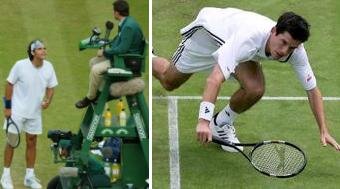 closer affair but it controversially turned Henman’s way at 5:5. Facing break point, Philippoussis was left exasperated when the lines-person failed to call Henman’s lob wide. “That was on the baseline but wide,” Philippoussis screamed at umpire Enric Molina but an overrule was not forthcoming and Henman had broken. Ominously for Philippoussis, the 29-year-old Briton served out for the set without losing a point on serve in the entire set. The Australian lost his cool again at 6:5 (30-all) up in the 3rd set after Molina failed to declare a Henman serve long. “What are you looking at, open your eyes,” Philippoussis shouted at Molina. Awarded a code violation for the use of an expletive during the outburst, Philippoussis retorted: “I should give you a violation because you suck.” The exchange appeared to spur Philippoussis on and he charged through the tiebreak. Henman then responded to the crowd’s support by breaking in a 6th game in the 4th set with a scintillating volley winner. He then earned and lost two match points at 5:2 and tortured the crowd further by being broken for the first time as he tried to serve out the match. The players entered a second tie-break but this time Henman kept his nerve to edge it 7/5, after wasting another two match points, and keeps alive hopes of ending Britain’s 68-year wait for a men’s Wimbledon champion. An unheralded Florian Mayer advanced to quarterfinals in his Wimbeldon debut. The German stunned 6-3, 6-7(5), 7-6(5), 6-4 Joachim Johansson. The Swede had been consistently serving a lot of aces in his four matches (34, 27, 39 & 23). Surprisingly he was out-aced by Mayer, who hit 24. Mayer said: “I’m surprised to be in the quarter-final because normally clay is my favourite surface.”
closer affair but it controversially turned Henman’s way at 5:5. Facing break point, Philippoussis was left exasperated when the lines-person failed to call Henman’s lob wide. “That was on the baseline but wide,” Philippoussis screamed at umpire Enric Molina but an overrule was not forthcoming and Henman had broken. Ominously for Philippoussis, the 29-year-old Briton served out for the set without losing a point on serve in the entire set. The Australian lost his cool again at 6:5 (30-all) up in the 3rd set after Molina failed to declare a Henman serve long. “What are you looking at, open your eyes,” Philippoussis shouted at Molina. Awarded a code violation for the use of an expletive during the outburst, Philippoussis retorted: “I should give you a violation because you suck.” The exchange appeared to spur Philippoussis on and he charged through the tiebreak. Henman then responded to the crowd’s support by breaking in a 6th game in the 4th set with a scintillating volley winner. He then earned and lost two match points at 5:2 and tortured the crowd further by being broken for the first time as he tried to serve out the match. The players entered a second tie-break but this time Henman kept his nerve to edge it 7/5, after wasting another two match points, and keeps alive hopes of ending Britain’s 68-year wait for a men’s Wimbledon champion. An unheralded Florian Mayer advanced to quarterfinals in his Wimbeldon debut. The German stunned 6-3, 6-7(5), 7-6(5), 6-4 Joachim Johansson. The Swede had been consistently serving a lot of aces in his four matches (34, 27, 39 & 23). Surprisingly he was out-aced by Mayer, who hit 24. Mayer said: “I’m surprised to be in the quarter-final because normally clay is my favourite surface.”
Quarterfinals: (CNN)
Like a couple of wisecracking comedians at a funeral there seemed an inappropriateness about the arrival of Roger Federer and Lleyton Hewitt on the post-Henman Centre Court that bordered on the distasteful. Empty seats gaped with grief and there was a wanness in the damp-cold wind that suggested an emotional need for healing time. But Federer then produced such tennis that within a couple of games the seats had filled once more with eager expectation. And by the time the 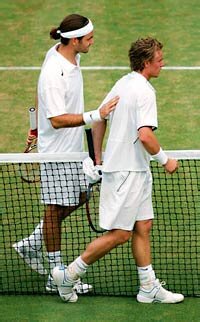 champion had won, 6-1, 6-7(1), 6-0, 6-4 (2 hours 20 minutes), the crowd, as if restored by good wake whisky, had rich colour in their cheeks. During the rain breaks they embarked, cheerfully, on a variety of Mexican waves, some slo-mo, others speeded up and one with open umbrellas that resembled a black storm sea. Hewitt had a storm of his own to contend with. By the end of the first set he was a broken man. He was broken twice, in fact, in the fourth and sixth games. He played unusually well, the best for 18 months according to the watching Boris Becker. And he lost the set 6-1 in 22 minutes. Only the rain, it seemed, could interrupt the flow of Federer’s sublime game. And that is what happened. They broke off twice in the second set, at 1:1 and 5:5, for about an hour. The set went to a tie-break and Hewitt ran away with it 7/1 against the bewildered Federer, whose timing had deserted him. It was the first set he had lost in these championships. But an even greater shock awaited Hewitt. He had not dropped his serve in his first three matches. But now he was broken three times as he lost the third set in just 25 minutes. Federer, coming to the net less often than when he won the title last year, was dominating from the baseline. What do you give the man who has everything? Certainly not an easy third set. Hewitt, however, is renowned for his fighting qualities. While Goran Ivanisevic said Federer was a “magician” last week, because of his power as well as his subtle spins and slices, Hewitt had been described as “a mongrel” by his compatriot Todd Woodbridge. Hewitt, who had appeared tethered to the baseline in the opening sets, attacked the net more in the 4th and drove for the lines. Remarkably, he broke Federer’s serve to go 4:3 up – remarkably because Federer came into this match having held 89 straight service games (unbroken in eight consecutive matches, four in Halle). But the champion broke back immediately, held for 5:4 (saving a couple of mini-set points) and then broke the Australian once more to take the match. The only disappointment in this most memorable encounter, the best of the tournament, is that the final point was Hewitt’s double fault. Federer said afterwards: “Lleyton made life really tough for me. He played really good tennis and I had to fight hard. But I played some really good tennis in the third set.” In tomorrow’s semi-finals Federer will play Sébastien Grosjean, who beat Florian Mayer 7-5, 6-4, 6-2 on No 1 court. It is the second consecutive semi-final for Grosjean, who beat Henman last year. Grosjean continues his quest to be the first French winner in the men’s singles since Henri Cochet in 1929. The 26-year-old 10th seed came into the quarter-final a strong favourite against 20-year-old Mayer who had only played one match on grass prior to Wimbledon. But in a tie pushed back late into the evening by a succession of rain showers, it was the German who made the first break to lead 2:0. Grosjean levelled quickly and took the set in the 12th game when he broke the Mayer serve for a second time. The 2nd set followed a similar pattern with Mayer breaking to lead and Grosjean hitting back to equalise. The Frenchman, beaten finalist at Queens to Andy Roddick, crafted out three set points in the 10th game and made it count on the first one as Mayer hit a sliced reverse wide. Mayer looked resigned to his fate as the 3rd set opened and Grosjean duly did the damage in the fourth game breaking to love with a forehand drive that dug in at Mayer’s feet. Tim Henman‘s Wimbledon dream crumbled in the quarterfinals for the second successive year when he was thrashed 7-6(5), 6-4, 6-2 by unseeded Croatian Mario Ancic on Wednesday. Henman was a sorry shadow of his normal self on an overcast Centre Court and his defeat left
champion had won, 6-1, 6-7(1), 6-0, 6-4 (2 hours 20 minutes), the crowd, as if restored by good wake whisky, had rich colour in their cheeks. During the rain breaks they embarked, cheerfully, on a variety of Mexican waves, some slo-mo, others speeded up and one with open umbrellas that resembled a black storm sea. Hewitt had a storm of his own to contend with. By the end of the first set he was a broken man. He was broken twice, in fact, in the fourth and sixth games. He played unusually well, the best for 18 months according to the watching Boris Becker. And he lost the set 6-1 in 22 minutes. Only the rain, it seemed, could interrupt the flow of Federer’s sublime game. And that is what happened. They broke off twice in the second set, at 1:1 and 5:5, for about an hour. The set went to a tie-break and Hewitt ran away with it 7/1 against the bewildered Federer, whose timing had deserted him. It was the first set he had lost in these championships. But an even greater shock awaited Hewitt. He had not dropped his serve in his first three matches. But now he was broken three times as he lost the third set in just 25 minutes. Federer, coming to the net less often than when he won the title last year, was dominating from the baseline. What do you give the man who has everything? Certainly not an easy third set. Hewitt, however, is renowned for his fighting qualities. While Goran Ivanisevic said Federer was a “magician” last week, because of his power as well as his subtle spins and slices, Hewitt had been described as “a mongrel” by his compatriot Todd Woodbridge. Hewitt, who had appeared tethered to the baseline in the opening sets, attacked the net more in the 4th and drove for the lines. Remarkably, he broke Federer’s serve to go 4:3 up – remarkably because Federer came into this match having held 89 straight service games (unbroken in eight consecutive matches, four in Halle). But the champion broke back immediately, held for 5:4 (saving a couple of mini-set points) and then broke the Australian once more to take the match. The only disappointment in this most memorable encounter, the best of the tournament, is that the final point was Hewitt’s double fault. Federer said afterwards: “Lleyton made life really tough for me. He played really good tennis and I had to fight hard. But I played some really good tennis in the third set.” In tomorrow’s semi-finals Federer will play Sébastien Grosjean, who beat Florian Mayer 7-5, 6-4, 6-2 on No 1 court. It is the second consecutive semi-final for Grosjean, who beat Henman last year. Grosjean continues his quest to be the first French winner in the men’s singles since Henri Cochet in 1929. The 26-year-old 10th seed came into the quarter-final a strong favourite against 20-year-old Mayer who had only played one match on grass prior to Wimbledon. But in a tie pushed back late into the evening by a succession of rain showers, it was the German who made the first break to lead 2:0. Grosjean levelled quickly and took the set in the 12th game when he broke the Mayer serve for a second time. The 2nd set followed a similar pattern with Mayer breaking to lead and Grosjean hitting back to equalise. The Frenchman, beaten finalist at Queens to Andy Roddick, crafted out three set points in the 10th game and made it count on the first one as Mayer hit a sliced reverse wide. Mayer looked resigned to his fate as the 3rd set opened and Grosjean duly did the damage in the fourth game breaking to love with a forehand drive that dug in at Mayer’s feet. Tim Henman‘s Wimbledon dream crumbled in the quarterfinals for the second successive year when he was thrashed 7-6(5), 6-4, 6-2 by unseeded Croatian Mario Ancic on Wednesday. Henman was a sorry shadow of his normal self on an overcast Centre Court and his defeat left 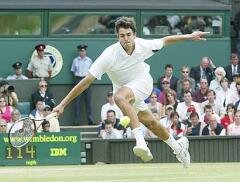 Britain still searching for its first men’s singles champion since 1936. Ancic, 20, made a name for himself in 2002 when he knocked out Federer in the first round and his huge serve and occasional baseline brilliance was too much for the British fifth seed who subsided totally in the third set. Despite all the talk of Ancic’s big serve, a tight 1st set was decided by two fine service returns from the Croatian, who is ranked 63 and yet to win a tour title. Henman could not get his first serve in and, to gasps of horror on Centre Court, netted careless forehand to give Ancic the decisive break for 4:3 in the 2nd set. The 3rd set was total disaster for the Briton, who has lost four times in the semifinals and whose chances of emulating the last British men’s winner, Fred Perry, are diminishing every year. Henman’s serve went to pieces and he quickly found himself 4:1 down. In contrast Ancic held his nerve admirably, clinching victory on his first match point with another heavy delivery that Henman tamely backhanded long. “I played a really good match,” said Ancic, who was appearing in his first grand slam quarter-final. “The first set was really tough, but from the second set I began to return better. That gave me a bit more confidence on my serve. From then on I was playing really good tennis and kept everything under control. I tried just to be as calm as I can be and I made it.” Ancic will now play Andy Roddick, who reached the Wimbledon semifinals for a second straight year with a no-nonsense win over Dutchman Sjeng Schalken. After two tight tie-break sets, the second seed and U.S. Open champion ran away with the third for a 7-6(4), 7-6(9), 6-3 victory on court one, showboating on match point with a spectacular leaping smash. “Hey, it was a dog-fight,” Roddick said. “I had to work for it out there. That second set tiebreak was huge, coming out straight off a rain break.” The American saved two set points in that tie-break (5:6, 8:9). Speaking of Ancic, Roddick added: “He is serving great. I don’t know what’s in the water in Croatia, but it seems like every player is over seven feet tall. It takes more than one tournament to become a consistent contender, you know. But he has the tools to develop into one, that’s for sure. He’s got weapons, and he’s a competitor. He fights every match.”
Britain still searching for its first men’s singles champion since 1936. Ancic, 20, made a name for himself in 2002 when he knocked out Federer in the first round and his huge serve and occasional baseline brilliance was too much for the British fifth seed who subsided totally in the third set. Despite all the talk of Ancic’s big serve, a tight 1st set was decided by two fine service returns from the Croatian, who is ranked 63 and yet to win a tour title. Henman could not get his first serve in and, to gasps of horror on Centre Court, netted careless forehand to give Ancic the decisive break for 4:3 in the 2nd set. The 3rd set was total disaster for the Briton, who has lost four times in the semifinals and whose chances of emulating the last British men’s winner, Fred Perry, are diminishing every year. Henman’s serve went to pieces and he quickly found himself 4:1 down. In contrast Ancic held his nerve admirably, clinching victory on his first match point with another heavy delivery that Henman tamely backhanded long. “I played a really good match,” said Ancic, who was appearing in his first grand slam quarter-final. “The first set was really tough, but from the second set I began to return better. That gave me a bit more confidence on my serve. From then on I was playing really good tennis and kept everything under control. I tried just to be as calm as I can be and I made it.” Ancic will now play Andy Roddick, who reached the Wimbledon semifinals for a second straight year with a no-nonsense win over Dutchman Sjeng Schalken. After two tight tie-break sets, the second seed and U.S. Open champion ran away with the third for a 7-6(4), 7-6(9), 6-3 victory on court one, showboating on match point with a spectacular leaping smash. “Hey, it was a dog-fight,” Roddick said. “I had to work for it out there. That second set tiebreak was huge, coming out straight off a rain break.” The American saved two set points in that tie-break (5:6, 8:9). Speaking of Ancic, Roddick added: “He is serving great. I don’t know what’s in the water in Croatia, but it seems like every player is over seven feet tall. It takes more than one tournament to become a consistent contender, you know. But he has the tools to develop into one, that’s for sure. He’s got weapons, and he’s a competitor. He fights every match.”
Semifinals: David Miller
Defending champion Roger Federer won a third-set tiebreaker Saturday to complete a straight-set victory over Sebastien Grosjean and reach the Wimbledon final against Andy Roddick, who beat 20-year-old Mario Ancic of Croatia 6-4, 4-6, 7-5, 7-5. The top-seeded Swiss star needed 29 minutes and four match points to complete a 6-2, 6-3, 7-6(6) win over the 10th-seeded Frenchman, extending his grass-court winning streak to 23 matches. The semifinal had been suspended with Federer two games from victory at 4:3 in the 3rd set – when play was suspended late Friday after a day of rain delays. “I’m very pleased,” Federer said. “It’s very difficult to stop at such a moment of the match. I’m very relieved. You never know what happens if he can  turn it around.” Federer will be playing in his third Grand Slam final. After winning Wimbledon last summer, he won the Australian Open in February and took over the No. 1 ranking. “This year has been fantastic for me” Federer said. “It’s still very difficult for me to understand why and how come that I’m so dominant this year. But every match I go with the same attitude out on the court. I’m a more complete player, more secure.” Federer has dropped only one set this tournament, against Hewitt in the semifinals, and lost serve just twice. “My matches have been rather easy, so I couldn’t make somersaults,” he said. “But I’m very happy to be again in the finals and to have the chance now, finally, to defend my title.” Federer looked as if he might close the match quickly Saturday, but he wound up fighting from behind – including 4:0 in the tiebreaker – in blustery conditions. Federer had two match points on Grosjean’s serve at 5:4, but the Frenchman saved both with service winners. Then Federer played a loose game and Grosjean broke for the first time to go up 6:5. But with Grosjean serving for the set, Federer settled down and broke back, shouting “Come on!” after smacking a forehand crosscourt pass for 6:6. The momentum swung back and forth in the tiebreaker, with Grosjean winning the first four points and Federer the next four. Federer earned his third match point at 6:5, but hit a backhand wide. He set up the fourth with a forehand volley, then converted with an inside-out forehand approach followed by an overhead. “I had to really fight hard to actually get to the tiebreaker,” Federer said. “I had two match points before the tiebreak and didn’t make them and suddenly he was serving for the set in the third. I had to come back in a tiebreaker. Luckily for me, I could turn it around.” Both players had 25 unforced errors, but Federer – the best all-around shotmaker in the game – finished with 49 winners, compared with 23 for Grosjean. The Frenchman lost his fourth major semifinal. On rain-interrupted Friday, Roddick had appeared comfortably in command when leading by a set at the watery conclusion but Ancic, with his appealing schoolboy demeanour, had other ideas. On the restart yesterday, he proceeded to take 16 of the first 19 points and surged to level at one set all. Would Roddick’s nerve hold in the face of an opponent who could give the ball as much punch as he could? While Ancic had taken 10 of his last 12 matches on grass this year, Roddick could point to a grass sequence of 20 victories in 21: the sixth longest in the Open era behind Bjorn Borg (41), John McEnroe and Pete Sampras (twice), Federer on 23 and Jimmy Connors on 21. The match, which was suspended Friday evening with Roddick leading 6-4, *4:3, 30/40, resumed on Court 1. After the resumption Ancic won three straight games breaking Roddick twice. Ace by ace, forehand by forehand, the pair edged to 4:4 in the third set. Ancic served a love-game and then came a half-hour rain interruption. Whether the key to a win was detected by Roddick himself or his coach Brad Gilbert,
turn it around.” Federer will be playing in his third Grand Slam final. After winning Wimbledon last summer, he won the Australian Open in February and took over the No. 1 ranking. “This year has been fantastic for me” Federer said. “It’s still very difficult for me to understand why and how come that I’m so dominant this year. But every match I go with the same attitude out on the court. I’m a more complete player, more secure.” Federer has dropped only one set this tournament, against Hewitt in the semifinals, and lost serve just twice. “My matches have been rather easy, so I couldn’t make somersaults,” he said. “But I’m very happy to be again in the finals and to have the chance now, finally, to defend my title.” Federer looked as if he might close the match quickly Saturday, but he wound up fighting from behind – including 4:0 in the tiebreaker – in blustery conditions. Federer had two match points on Grosjean’s serve at 5:4, but the Frenchman saved both with service winners. Then Federer played a loose game and Grosjean broke for the first time to go up 6:5. But with Grosjean serving for the set, Federer settled down and broke back, shouting “Come on!” after smacking a forehand crosscourt pass for 6:6. The momentum swung back and forth in the tiebreaker, with Grosjean winning the first four points and Federer the next four. Federer earned his third match point at 6:5, but hit a backhand wide. He set up the fourth with a forehand volley, then converted with an inside-out forehand approach followed by an overhead. “I had to really fight hard to actually get to the tiebreaker,” Federer said. “I had two match points before the tiebreak and didn’t make them and suddenly he was serving for the set in the third. I had to come back in a tiebreaker. Luckily for me, I could turn it around.” Both players had 25 unforced errors, but Federer – the best all-around shotmaker in the game – finished with 49 winners, compared with 23 for Grosjean. The Frenchman lost his fourth major semifinal. On rain-interrupted Friday, Roddick had appeared comfortably in command when leading by a set at the watery conclusion but Ancic, with his appealing schoolboy demeanour, had other ideas. On the restart yesterday, he proceeded to take 16 of the first 19 points and surged to level at one set all. Would Roddick’s nerve hold in the face of an opponent who could give the ball as much punch as he could? While Ancic had taken 10 of his last 12 matches on grass this year, Roddick could point to a grass sequence of 20 victories in 21: the sixth longest in the Open era behind Bjorn Borg (41), John McEnroe and Pete Sampras (twice), Federer on 23 and Jimmy Connors on 21. The match, which was suspended Friday evening with Roddick leading 6-4, *4:3, 30/40, resumed on Court 1. After the resumption Ancic won three straight games breaking Roddick twice. Ace by ace, forehand by forehand, the pair edged to 4:4 in the third set. Ancic served a love-game and then came a half-hour rain interruption. Whether the key to a win was detected by Roddick himself or his coach Brad Gilbert, 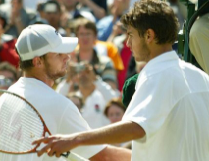 the key to the result had become evident – Ancic was in trouble when ambitiously advancing to the net. On the second resumption, Roddick proceeded slightly to drop pace and lure Ancic forward, testing him with dipping drives that obliged him to play low volleys. In the first three games, he made five crucial errors, lost them all and with it the set, Roddick clinching it with three huge first serves, including two aces. Now the pressure was on the younger man. He proved game for the fight. Leading 4:3 in the fourth set, he had a break point when Roddick double-faulted but an ace snuffed the moment. Serving at 5:5, Ancic lost the grip on his racket, lost the point, twice double-faulted and was on the brink. Nonetheless, Roddick was not allowed victory at the first grasp. Twice Ancic saved match point and even had a point to break back for 6:6, but missed it with another loose volley. Ancic, however, had no sense of anticlimax. “I was enjoying playing in this kind of match,” he said, “and I have to admit he was a little bit better. I was fighting good with my volleys, I had a couple of break points I didn’t use, some unforced errors but I think I’ve already improved from when I played him at Queen’s because I was rallying much better from the back and also returning better.” Ancic referred to their match two weeks before which Roddick won 7-6, 4-6, 6-4.
the key to the result had become evident – Ancic was in trouble when ambitiously advancing to the net. On the second resumption, Roddick proceeded slightly to drop pace and lure Ancic forward, testing him with dipping drives that obliged him to play low volleys. In the first three games, he made five crucial errors, lost them all and with it the set, Roddick clinching it with three huge first serves, including two aces. Now the pressure was on the younger man. He proved game for the fight. Leading 4:3 in the fourth set, he had a break point when Roddick double-faulted but an ace snuffed the moment. Serving at 5:5, Ancic lost the grip on his racket, lost the point, twice double-faulted and was on the brink. Nonetheless, Roddick was not allowed victory at the first grasp. Twice Ancic saved match point and even had a point to break back for 6:6, but missed it with another loose volley. Ancic, however, had no sense of anticlimax. “I was enjoying playing in this kind of match,” he said, “and I have to admit he was a little bit better. I was fighting good with my volleys, I had a couple of break points I didn’t use, some unforced errors but I think I’ve already improved from when I played him at Queen’s because I was rallying much better from the back and also returning better.” Ancic referred to their match two weeks before which Roddick won 7-6, 4-6, 6-4.
Final: AP
Barely in command of a tight Wimbledon final against Andy Roddick, Roger Federer hit a shot that clipped the net and popped over, helping set up a backhand winner. Federer cemented his status as the game’s No. 1 player with his victory Sunday. Roddick put his palms up and looked at the crowd. The consummate showman walked to the net, grabbed it with both hands and shook it wildly, as if cleaning a throw rug. Spectators chuckled. “If you were helping him get points,” Roddick said later, 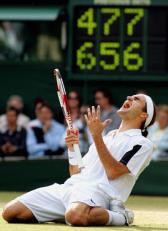 “I’d shake you, too.” Federer needs little assistance out on the court these days, particularly when it comes to tennis’ biggest stages. He’s won two straight Wimbledon titles and three of the past five majors after absorbing Roddick’s best and beating him 4-6, 7-5, 7-6(3), 6-4 Sunday in 2 hours 31 minutes. It was the first final at the All England Club since 1982 featuring men seeded Nos. 1 and 2, and Federer showed Roddick he still has work to do to regain the top spot. “I just knew that my only chance actually to win today is if I stay very calm, and if I get a little luck, I could turn it around,” Federer said. “I knew I wasn’t far away from winning.” He did it with a key change in strategy during a 40-minute rain delay, which came with Roddick up 4:2 in the third set. Until then, Roddick was doing just about everything right, taking charge of points, going to the net with success, and breaking serve four times – twice as many as Federer’s previous six opponents combined. In the 2nd set Federer had a game point to lead 5:0, but Roddick broke twice to level at 4-all! “He was putting me under pressure,” Federer said. “I couldn’t really play the way I wanted to.” So the defending champion opted to charge the net more, sort of like a football coach going from a running game to a no-huddle offense. Except Federer doesn’t have a coach: he’s gone it alone since firing Peter Lundgren in December. “This is a very important phase in his career as well, that he could step back, not rely on somebody, get to know himself, get to know his own tennis and technique,” said Federer’s mother, Lynette. “And I’ve got a feeling that a period without a coach – I don’t say it’s ideal – but he has also taken a lot of initiative.” He sure did Sunday, and the switch worked: Federer won 24 of the next 28 points on his serve. There were other keys to the shift in the match. Federer began gauging Roddick’s intimidating serve, getting his racket on offerings that topped 140 mph. And Roddick was less and less successful at the net himself. Volleying never has been his strength, and after going a surprising 6-of-9 on net points in the first set, he was 15-of-35 in the last three. To Roddick’s credit, he had Federer on his heels early, whipping his fearsome forehand to the corners and even coming up some sizzling backhand passing shots. “I wasn’t wanting to get in rallies where he could kind of do his thing, come up with spectacular stuff,” Roddick said. “I went out and I tried to take it to him. I was successful most of the time. And then on a couple of key points, I wasn’t.” In particular, there were six break points he failed to convert in the fourth set. Two came while up 3:2. On the first, Roddick smacked a forehand, seemingly a point-ender. Somehow, scrambling along the worn, muddy baseline, Federer got to the ball, whipped it back, and Roddick sailed a forehand wide. “Not only is he fast, but when he gets to the ball, he can have no play on it and make something out of it,” Roddick said. “He’s unparalleled as far as that skill goes.” Roddick wasted his final break point with an errant forehand. The next point ended with Roddick’s net-shaking routine. If he wanted to break the tension, he appeared to break his concentration. Roddick lost that game on the next point, then made three unforced errors to get broken at love. “He always shows a lot of emotions, if it’s positive or negative,” Federer said. “I just knew that my only chance actually to win today is if I stay very calm.” He took a 4:3 edge there, then held serve twice to win the title. He ended the match with a 124 mph ace, giving him a 12-11 edge in that stat, then sank to his knees at the baseline, the way Bjorn Borg used to when he was winning five straight Wimbledon titles from 1976-80. Only Borg won more consecutive matches on grass (41) than Federer’s current streak of 24. Afterward, the players took the traditional walks around Center Court with their trophies, waving at fans and posing for photographers. Their paths crossed, and Roddick took a playful swipe at Federer’s Challenge Cup. It was a tiny snapshot of the type of entertainment Roddick can provide. During the match, he clasped his hands and looked at the sky to give thanks after a net
“I’d shake you, too.” Federer needs little assistance out on the court these days, particularly when it comes to tennis’ biggest stages. He’s won two straight Wimbledon titles and three of the past five majors after absorbing Roddick’s best and beating him 4-6, 7-5, 7-6(3), 6-4 Sunday in 2 hours 31 minutes. It was the first final at the All England Club since 1982 featuring men seeded Nos. 1 and 2, and Federer showed Roddick he still has work to do to regain the top spot. “I just knew that my only chance actually to win today is if I stay very calm, and if I get a little luck, I could turn it around,” Federer said. “I knew I wasn’t far away from winning.” He did it with a key change in strategy during a 40-minute rain delay, which came with Roddick up 4:2 in the third set. Until then, Roddick was doing just about everything right, taking charge of points, going to the net with success, and breaking serve four times – twice as many as Federer’s previous six opponents combined. In the 2nd set Federer had a game point to lead 5:0, but Roddick broke twice to level at 4-all! “He was putting me under pressure,” Federer said. “I couldn’t really play the way I wanted to.” So the defending champion opted to charge the net more, sort of like a football coach going from a running game to a no-huddle offense. Except Federer doesn’t have a coach: he’s gone it alone since firing Peter Lundgren in December. “This is a very important phase in his career as well, that he could step back, not rely on somebody, get to know himself, get to know his own tennis and technique,” said Federer’s mother, Lynette. “And I’ve got a feeling that a period without a coach – I don’t say it’s ideal – but he has also taken a lot of initiative.” He sure did Sunday, and the switch worked: Federer won 24 of the next 28 points on his serve. There were other keys to the shift in the match. Federer began gauging Roddick’s intimidating serve, getting his racket on offerings that topped 140 mph. And Roddick was less and less successful at the net himself. Volleying never has been his strength, and after going a surprising 6-of-9 on net points in the first set, he was 15-of-35 in the last three. To Roddick’s credit, he had Federer on his heels early, whipping his fearsome forehand to the corners and even coming up some sizzling backhand passing shots. “I wasn’t wanting to get in rallies where he could kind of do his thing, come up with spectacular stuff,” Roddick said. “I went out and I tried to take it to him. I was successful most of the time. And then on a couple of key points, I wasn’t.” In particular, there were six break points he failed to convert in the fourth set. Two came while up 3:2. On the first, Roddick smacked a forehand, seemingly a point-ender. Somehow, scrambling along the worn, muddy baseline, Federer got to the ball, whipped it back, and Roddick sailed a forehand wide. “Not only is he fast, but when he gets to the ball, he can have no play on it and make something out of it,” Roddick said. “He’s unparalleled as far as that skill goes.” Roddick wasted his final break point with an errant forehand. The next point ended with Roddick’s net-shaking routine. If he wanted to break the tension, he appeared to break his concentration. Roddick lost that game on the next point, then made three unforced errors to get broken at love. “He always shows a lot of emotions, if it’s positive or negative,” Federer said. “I just knew that my only chance actually to win today is if I stay very calm.” He took a 4:3 edge there, then held serve twice to win the title. He ended the match with a 124 mph ace, giving him a 12-11 edge in that stat, then sank to his knees at the baseline, the way Bjorn Borg used to when he was winning five straight Wimbledon titles from 1976-80. Only Borg won more consecutive matches on grass (41) than Federer’s current streak of 24. Afterward, the players took the traditional walks around Center Court with their trophies, waving at fans and posing for photographers. Their paths crossed, and Roddick took a playful swipe at Federer’s Challenge Cup. It was a tiny snapshot of the type of entertainment Roddick can provide. During the match, he clasped his hands and looked at the sky to give thanks after a net 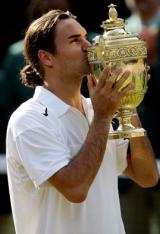 cord went his way. He barked at himself or clenched a fist or screamed, “Come on!” If Roddick played for laughs on occasion, Federer played only for keeps. He punctuated points with yells, too – in three languages: “Yeah!” or “Allez!” or “Nein!” – but it was always quick, as if he were embarrassed to be making a display. Federer is downright serious, all right. “For me, winners stay, and losers go,” he said. “I don’t want to be one of them who goes.” After being labeled early on as someone unable to win the big ones, Federer is 3-0 in championship matches at majors. He’s also won his last eight finals overall. “I kind of like it – the 100 percent record in the finals of Grand Slams. These are the ones that really, really count,” Federer said. “Grand Slam titles put you just a step higher.” He’s 46-4 with a tour-leading six titles in 2004, including the Australian Open. Federer is the first man since Andre Agassi in 1999 to win two majors in a year. If Federer, 22, and Roddick, 21, are a cut above the rest, it’s clear who has the upper hand between the top duo: The Swiss star is 6-1 against the American. “Roger just played too good today. I threw the kitchen sink at him, but he went to the bathroom and got a tub,” Roddick said. “I’m going to have to start winning some of them to call it a rivalry.“ It was Federer’s 17th title. Stats of the final
cord went his way. He barked at himself or clenched a fist or screamed, “Come on!” If Roddick played for laughs on occasion, Federer played only for keeps. He punctuated points with yells, too – in three languages: “Yeah!” or “Allez!” or “Nein!” – but it was always quick, as if he were embarrassed to be making a display. Federer is downright serious, all right. “For me, winners stay, and losers go,” he said. “I don’t want to be one of them who goes.” After being labeled early on as someone unable to win the big ones, Federer is 3-0 in championship matches at majors. He’s also won his last eight finals overall. “I kind of like it – the 100 percent record in the finals of Grand Slams. These are the ones that really, really count,” Federer said. “Grand Slam titles put you just a step higher.” He’s 46-4 with a tour-leading six titles in 2004, including the Australian Open. Federer is the first man since Andre Agassi in 1999 to win two majors in a year. If Federer, 22, and Roddick, 21, are a cut above the rest, it’s clear who has the upper hand between the top duo: The Swiss star is 6-1 against the American. “Roger just played too good today. I threw the kitchen sink at him, but he went to the bathroom and got a tub,” Roddick said. “I’m going to have to start winning some of them to call it a rivalry.“ It was Federer’s 17th title. Stats of the final
***********************************



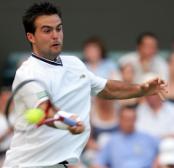


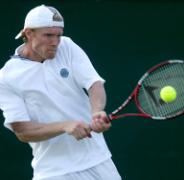




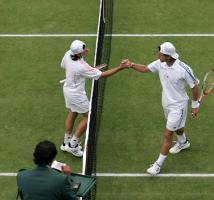

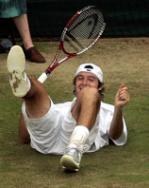

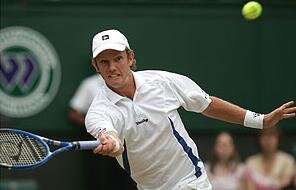


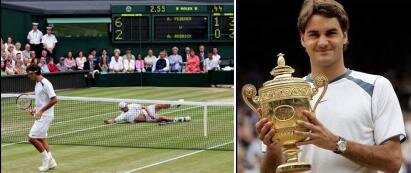
YT films:
2004
Hewitt vs. Ivanisevic
Henman vs. Philippoussis
Roddick vs. Schalken
Federer vs. Hewitt
Federer vs. Roddick (full match)
2005
Federer vs. Gonzalez
Federer vs. Hewitt
Federer vs. Roddick (full match)